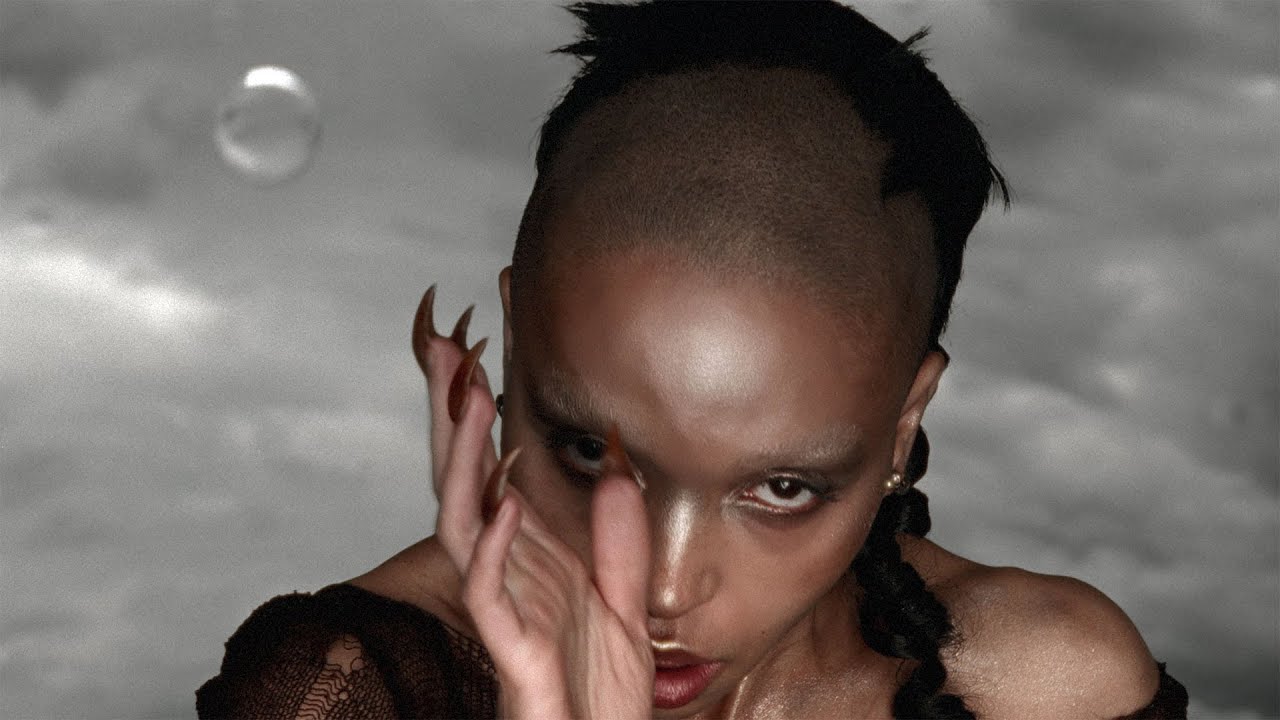FKA twigs has always found a home on the dancefloor. From the balletic intricacy of her early EPs, to the loosened-up dancehall of 2022’s mixtape Caprisongs, her music embodies the physicality and control one would expect from a long-time dancer. Even at their most sparse, her songs are intensely crafted, deftly choreographed – each sonic limb considered, much as a dancer considers her whole body in the dance.
On her excellent third album Eusexua, twigs doesn’t just allude to the dancefloor, or apply her learnings from it: she becomes enveloped by it, channeling its freedom into her own focused vision, like a single dancer channelling the communal energy of the club. Like Charli XCX’s brat, Eusexua is an avant-pop album heavily influenced by dance music that taps into the potential of hedonism, but takes it in the opposite direction. For twigs, hedonism is personally liberating, almost spiritual; outward-facing rather than introspective.
The album Eusexua most resembles – both spiritually and musically – is Madonna’s mid-career classic Ray of Light, another major aesthetic shift that elevated the club to celestial heights. The most straightforward analogue for this comparison is ‘Girl Feels Good’, a breezy, sensual mix of electric guitars and synths, which even features William Orbit-esque electronic pulses. Co-produced by twigs and regular collaborator Koreless, along with duo Ojivolta, it’s a plea to those experiencing a crisis of masculinity to channel feminine energy for their own good and for that of the world (“Your mother’s lover’s sister’s heart is where there’s healing”). Here, twigs presents female pleasure as a tool for peace, with the shrewd bossiness of a true Capricorn (“A girl feels good / And the world goes round / So turn your love up loud / To keep the devil down”).
Allusions to relationship pain and specifics are largely gone in favour of expressions of pure feeling. This switch is clearest in the kaleidoscopic free-association of the title track, the ‘Lights On’-referencing ‘Sticky’ (“I’m tired of messing up my life with / Overcomplicated moments and sticky situations”), and the pulsing, techno-pop single ‘Perfect Stranger’, where twigs seeks out no-strings pleasure (“I don’t know / And I don’t care / That’s ok with me”). This is met with a sense of streamlined pop intention: the album’s melodies are twigs’ catchiest to date, and her vocals are clearer and more direct than ever before. Where her vocal technique on Magdalene drew comparisons to Vespertine and Medúlla-era Björk, ‘Room of Fools’ is reminiscent of ‘Big Time Sensuality’ or ‘There’s More to Life Than This’ – with twigs yelping and growling over a pulsating piano-house instrumental. Her whispered and subsumed tones are still present as textures in the background, but here they are foregrounding a more assured lead vocal line.
Eusexua’s hooks and pulsating beats coexist with twigs’ signature knots and intricacies. Electronics slice and crunch, vocals briefly glitch; the mood is subtly complicated, even if just for a second. As the album continues past its astonishing opening run of singles, the song structures become more unexpected. ‘Striptease’, a sensuous slice of R&B analogous with twigs’ early work, makes a heel-turn into drum and bass. The slow-burn highlight ‘Keep It, Hold It’ reveals its myriad treasures over several listens, expanding and retracting from neo-classical minimalism to miles-wide trance, threaded with glacial vocals from twigs and a suite of choral singers. Its reverent, patient piano part is played by Kelly Moran, whose exceptional 2024 album Moves in the Field shares twigs’ obsession with the transformative potential of dance, and music influenced by it.
The mood of Eusexua is largely consistent, but its individual parts are varied and characterful, at least partly due to to the large number of collaborators on the album. Unlike Caprisongs, which cultivated a hangout vibe with a handful of featured vocalists, Eusexua’s collaborators – among them Moran, Eartheater and Stargate – are all situated behind-the-scenes. The single guest vocal comes on the album’s only misfire ‘Childlike Things’, which bizarrely features vocals from North West, the eleven-year old daughter of Kanye West and Kim Kardashian, who contributes a rap in English and Japanese. With its sing-song chorus, brattish chanting and self-consciously zany lyrics (“Like a chocolate teapot / Melt ‘em down and burn ‘em up”) it sticks out on an otherwise sophisticated album, and is just plain annoying.
The closing song ‘Wanderlust’ is an emotional gut-punch, a comedown reflection that pulls back the curtain and interrupts the album’s narrative of emancipatory pleasure-seeking. Here, twigs allows us a glimpse at the flipside of euphoria, an auto-tuned moment of loneliness and bodily irritability (“I can criticise the world / When I’m sat at home in bed”) that causes her to yearn for an out-of-body experience of spirituality (“It’s alright / To be the light / To cross the sea / I’ll be in my head if you need me”). The music swells from minimal guitar to swirling electronics, but never quite peaks, then fades out without conclusion. It’s an intriguing endpoint for such a sharply-focused album; a reminder of the human imperfection that both sparks and complicates utopian ideals
Eusexua is a compelling case for sex, dancing and the pleasure that they bring as tools – not just for personal but universal emancipation. It’s a thesis that has inspired many a pop album, but which is thrilling to experience with such conceptual, musical and lyrical cohesion. Analysis aside, it’s also just thrilling in a purely visceral, physical sense. Like dancing itself, it’s an alchemic transformation of intention into pure sensation.




